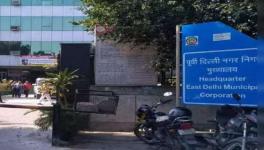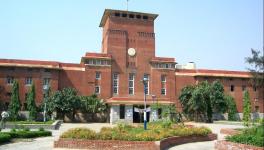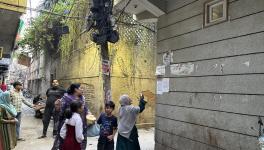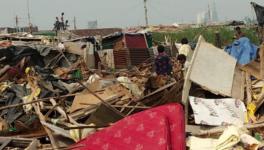One Month into Hathras Victim’s Death, Women, Dalit Groups Demand ‘Change, Not Revenge’
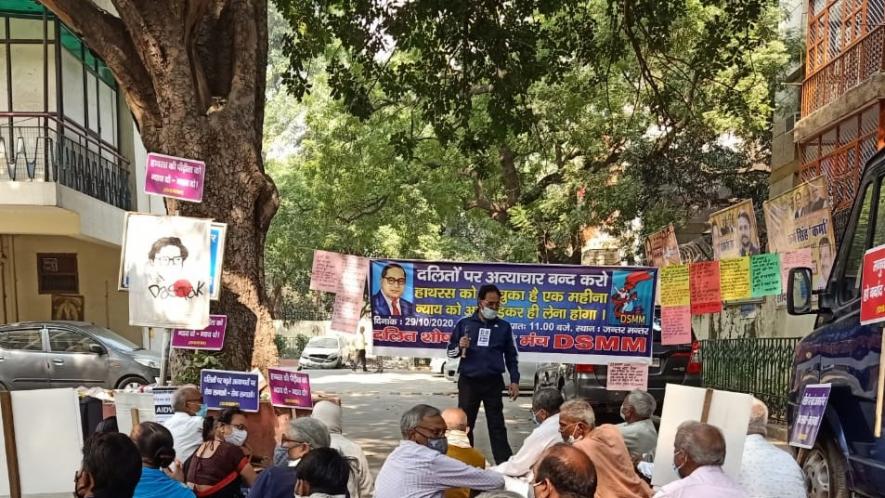
New Delhi: Multiple women’s groups came together to register their protest in Delhi on Thursday, to mark the one month death anniversary of the victim in the Hathras case, who had succumbed to her injuries on September 29 at the Safdarjung Hospital in the national capital.
The protesting women – mostly working – were led by different groups at several demonstration sites. They pressed for a safe environment for women in cities across the country while demanding an immediate deliverance of justice to the dalit teen from Hathras. In a separate protest organised by a dalit organisation in the capital, similar demands were raised.
A 19-year old girl, belonging to the landless Valmiki caste, was brutally assaulted and allegedly raped by four upper-caste, landed Thakur men in Uttar Pradesh’s Hathras district last month.
On Thursday, organisations like the All India Democratic Women’s Association (AIDWA), National Federation of Indian Women (NFIW), and Satark Nagrik Sangathan (SNS) among others, took to the streets nationwide under the banner of Hum Agar Utthe Nahin Toh (If we do not rise), a campaign initiated this year on the third anniversary of the assassination of journalist-turned-activist Gauri Lankesh.
The umbrella body now has over 400 women’s groups, LGBTQI collectives and human rights organisations spread across all the states in the country.
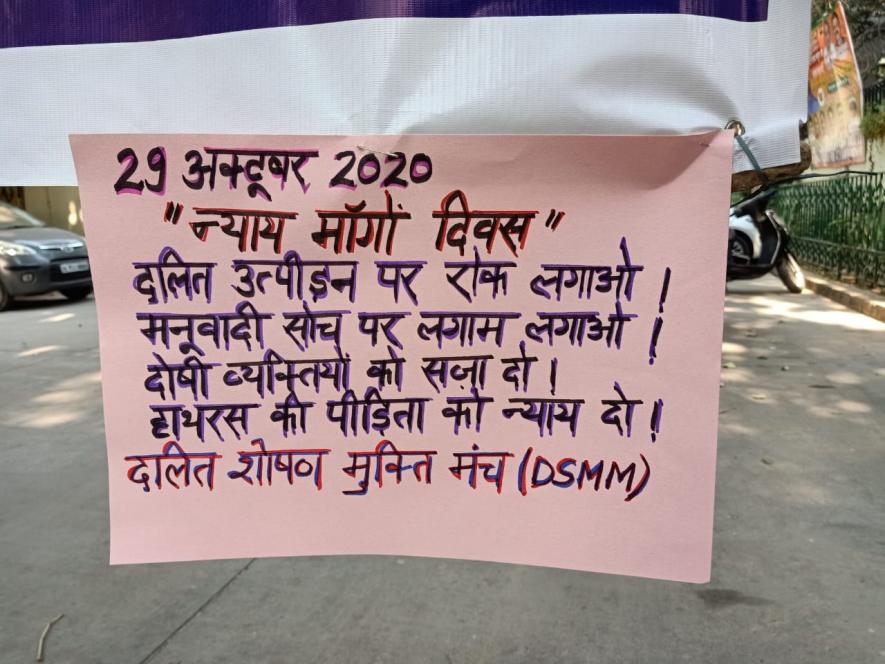
In the national capital, protests were held throughout the day in areas including Mangolpuri, South Delhi’s Jagdamba Camp, North East Delhi’s Gurmandi, Nizamuddin, along with in industrial towns such as Narela and Bawana – all comprising sizeable populations of economically-weaker sections of women engaged in construction and domestic work among other things.
A common refrain of the women in these areas was the lack of safety and myriad occasions of harassments that they encounter, especially while returning to their home in the evening. “There are no street lights in my area; it has become a daily affair of coming across men – usually drunk – in the evenings who don’t shy from passing lewd comments,” cried a woman, during the protest at Jagdamba Camp, adding that she does not feel safe at all.
A 2019 survey estimated that over 40% of women report feeling “unsafe” outdoors, while nearly 80% says that not much has been made by authorities to provide a safer environment for women in the country.
“What had happened to the girl in Hathras could very well happen to us any day,” lamented another woman at Bawana. “The police and other government machineries that are meant for our safety also seem to be failing the women,” she added.
And hence, “Badlaav chaiye, badlaa nahin” (want a change, not revenge) – was the slogan picked up by the women during the protests as they vowed to “struggle till they register a win.”
A nationwide protest was also called by the Dalit Shoshan Mukti Manch (DSMM), a national platform “for action against caste discrimination and for social justice.” People assembled near Parliament Street and sloganeered against the Bharatiya Janata Party (BJP) government in UP, which has been accused of “protecting” the perpetrators of the crime in Hathras.
The demonstration was also joined by a group of lawyers, who are representing the family of a teenager from a backward class in Delhi. The 17-year old Delhi girl was discovered dead in the house where she had been working for a week as a domestic help. While her family had accused the employer of rape and murder, Delhi Police has failed to file an FIR even after more than a fortnight.
The women-led protests were live streamed on social media platforms in what the organisers termed as a “web rally.” Leaders of various groups were joined in, along with some cultural artists, to voice their anger over rising atrocities against the marginalised sections.
Similarly, other virtual meetings were organised to spread a political awareness among the women with regards to their rights and how they can hold the authority accountable.
Anjali Bhardwaj, a founding member of SNS, highlighted the importance of the various machineries of the state to ensure women’s safety in the country. “The commissions – that of SCs and STs and women – along with the judiciary, and police must function properly. When they fail the people lose trust in the law and order processes,” she said.
It is then, when demands of capital punishment are raised in matters relating to rapes, Bhardwaj says, adding that it is a wrong solution to the prevailing problems.
To be sure, the latest Crime in India report by the National Crime Records Bureau (NCRB) notes as many as 88 rape cases took place every day in 2019, on an average, with conviction rate in these cases at alarmingly low level of about 27%.
Shabnam Hashmi, a social activist and founding member of ANHAD (Act Now for Harmony and Democracy), a socio-cultural organisation, spoke about the grief of the victim’s family in Hathras and demanded a time-bound justice in the matter.
Hashmi was one among the eight-member women delegation, which had visited the victim’s family in Hathras on October 5. She alleged, while addressing the web rally, that the victim’s family had informed them then of being “intimidated,” and accused the police administration of “causing delay at every step.”
Currently, the matter is being investigated by the Central Bureau of Investigation (CBI), with the Allahabad High Court allowed by the apex court to monitor all aspects of the case.
Get the latest reports & analysis with people's perspective on Protests, movements & deep analytical videos, discussions of the current affairs in your Telegram app. Subscribe to NewsClick's Telegram channel & get Real-Time updates on stories, as they get published on our website.









